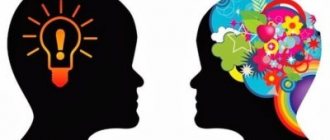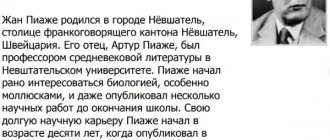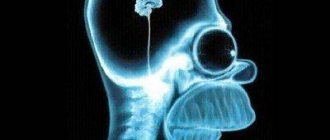People have long begun to think about the question why some people can easily solve complex mathematical problems or write essays, poetry, music, while others must make every effort to do this, and the result will not always be good. Why can some people draw a beautiful landscape or portrait, but they cannot solve a physics problem?
A person's abilities are determined by his intelligence. This is not one concept, it comes in several types. In psychology, there are 9 varieties that have their own character traits and predisposition to science.
Gardner's theory
In 1994, psychologist Howarth Gardner created the theory of multiple intelligences. It has become an alternative to the classical view of the nature of intelligence, as an individual’s ability to think logically.
Gardner believed that it is the multiple nature of intelligence that allows an individual to choose a profession or hobby for which he has the most pronounced predisposition.
The psychologist described intelligence not as a specific device that is located in the head, but as a potential that allows a person to use all his abilities in a certain situation.
Gardner identifies 7 types of intelligence in psychology, which do not depend on one another and can exist as separate systems with their own rules. Over time, the theory was interpreted, refined, and several more types were added.
Highlight:
- natural (naturalistic);
- musical;
- logical-mathematical;
- existential (philosophical);
- kinesthetic (bodily);
- interpersonal (social);
- spatial (figurative);
- linguistic (verbal);
- personal (internal).
Gardner's theory allowed us to take a fresh look at the concept of talent, ability and intelligence. The psychologist argued that different people have different types of intelligence. Therefore, if at school some students have a penchant for exact sciences and are considered smart, and those who easily find a common language with other children are considered chatterboxes and slackers, then this is wrong. Different types of intelligence are in demand in different professions.
Intelligence, what is it?
Intelligence in Latin means knowledge. A person’s ability to adapt to the environment based on experience, analyze and apply received information in life, reflect and strive for knowledge - all these are functions of the intellect.
Until recently, it was believed that intelligence has a general function of cognition. In this connection, training was based on providing information that the student must learn. But it’s no secret that school performance is distributed approximately like this: 10% are excellent students, 40% are excellent students, 50% are C students. It turns out that only ten out of a hundred children acquire knowledge fully. The rest are either lazy or can’t, why? Howard Gardner tried to answer this question.
Natural
This type determines a person’s ability to interact with nature: to feel the animal and plant world. A person notices everything that is around him. He is interested in exploring plants, studying animals, their habits, classifying species, monitoring the weather, collecting butterflies or minerals.
A person with natural intelligence loves nature and outdoor recreation. For him there is no better holiday than going to the forest, to the lake or to the mountains. This ability was considered a gift by our ancestors. It was possessed by great hunters, berry and mushroom gatherers.
Despite the fact that such an ability is becoming a thing of the past, due to the development of technology, which has become firmly established in life, people will find themselves in such professions as:
- livestock farming;
- botany;
- gardening;
- astronomy;
- chemistry;
- cooking;
- agronomy;
- archaeologist.
This type of intelligence used to be incredibly in demand. After all, our ancestors interacted closely with nature: they collected herbs, fruits, and hunted. This gift was considered incredibly useful, and its owner received respect.
Notes
- Headquarters, Army Directorate. (2004). Intelligence (FM 2-0) | (https://www.globalsecurity.org/intell/library/policy/army/fm/2-0/chap7.htm).
- "Photography before Edgerton."
- Downing, Taylor (2011). Spies in the sky
. Small brown hardcover books (A and C). paragraph 42. ISBN 9781408702802. - Cotton, Sydney (1969). Uncommon Aviator: The Story of Sidney Cotton
. Chatto & Windus. paragraph 169. ISBN 0-7011-1334-0. - Downing, Taylor (2011). Spies in the sky
. Small brown hardcover books (A and C). pp. 80–81. ISBN 9781408702802. - Unlocking Buckinghamshire's past
- ^ a b c
Allied Central Interpretation Bureau (ACIU) Archived March 12, 2013 Wayback Machine - ^ a b
"Operation Crossbow", BBC2, broadcast 15 May 2011. - "GAMBIT History, Appendix A, page 154, first edition September 2011." National Intelligence. June 1991 Archived from the original on 2012-09-01. Retrieved 2013-07-26.
- "Discoverer 14 - NSSDC ID: 1960-010A." NASA.
- "Imint Resolution Comparison". Federation of American Scientists.
- https://fas.org/irp/doddir/army/fm2-0.pdf
Musical
A person with musical intelligence has developed hearing and a sense of rhythm. He easily grasps and distinguishes musical tones and melodies. He can easily sense a false note and pick out the chords of a song by ear.
He loves music, studies different styles, he likes to play musical instruments, because it comes easy. Talent is manifested in composing songs and poems, playing musical instruments, and singing. Such people easily improvise and become the life of the party.
Musical intelligence manifests itself earlier than others. Babies begin to respond to songs and move in rhythm before they begin to walk and talk. It's rare, but there are real geniuses like Yo-Yo Ma, who performed his first concert at the age of 6 years.
Professions:
- conductor;
- composer;
- arctic fox;
- musician;
- DJ;
- director;
- music producer.
If a person has not only musical, but also mathematical abilities, then one can easily become a drummer. After all, he must not only feel the rhythm, but also be able to count quickly.
Multiple Minds in the Classroom: Activities for Education
With the help of Howard Gardner, educator and author Thomas Armstrong decided to apply the theory of multiple intelligences to the educational field, writing his famous book Multiple Intelligences in the Classroom in 1999.
In this book, Armstrong proposes studying and describing students' mental abilities with the goal of developing mental abilities in the classroom. The teacher himself admits that developing a profile of multiple intelligences is not something simple, however, he offers a series of statements for each type of intelligence so that we can correctly classify babies depending on whether they feel identified with these statements.
Diverse mental abilities and learning strategies
To promote students' personal development and human potential, it is important to apply teaching strategies to each student according to the type of intelligence we want to work on. For example, if we want to develop spatial intelligence, We can perform the following dynamics:
- display
- Colored signs
- Graphic metaphors
- Sketches of ideas
- Graphic symbols
On the other hand, if we want to promote interpersonal intelligence, the teaching strategies will be as follows:
- Share with your classmates
- Make collaboration groups
- Board games
- Role-playing games between classmates
Nowadays people talk about holistic child development, that is, it includes all aspects of development (physical, sexual, cognitive, social, moral, linguistic, emotional, etc.), this is the basis of the theory of Development of Multiple Intelligences.
There are two types of extreme experiences that are key to the development of intelligence that are important to take into account, crystallizing experiences and paralyzing experiences.
- First, crystallizing experiences, they are milestones in personal history, keys to the development of people's talents and skills. Often these events occur in early childhood. This experience is the one that ignites the spark of the intellect and begins its development towards maturity.
- On the other hand, paralyzing experiences exist as an analogue of the previous ones, they belong to those experiences that block the development of intelligence, they are full of negative emotions that can stop the normal development of intelligence. Feelings of fear, shame, guilt, hatred prevent you from growing intellectually. It is likely that after this experience the child decides not to go near the musical instrument or draw anymore because he has already decided that “he can’t do it.”
Logical-mathematical
People with this ability easily understand all problems related to numbers and mathematical concepts. They will find themselves in mathematics, computer science or logistics. Such abilities allow you to easily solve complex problems and carry out calculations, even with a large amount of data. These abilities are also suitable for detectives.
A person with logical thinking loves numbers more than live communication with other people, so he is unsociable. He is interested in solving logical problems, puzzles, and equations. Many become programmers.
People with a logical-mathematical type of intelligence are characterized by rapid recognition of connections between two objects, consistent reasoning, and noticing the smallest details. Suitable professions:
- mathematician;
- detective;
- composer;
- economist;
- conductor;
- physicist;
- engineer;
- financier;
- analyst.
Classification according to T. Buzan
The structure and types of intelligence were also presented by T. Buzan. Its classification is similar to Gardner's division and is as follows.
- Logical-mathematical. Making sense of arguments.
- Linguistic. Understanding and expressing speech.
- Spatial. Visualization of an image in the mind.
- Musical. A clear sense of rhythm, harmony, tone of sound.
- Bodily-kinesthetic. Hand-eye coordination, learning things through body movements.
- Social. Interacting with others as both a leader and a follower.
- Emotional. Understanding both your own and others' emotions.
- Intuitive. Reason influencing intuition.
- Perspective. Understanding another point of view without expressing it.
- Stationary. Understanding something without any preconceptions.
Some models even approach the problem from the point of view of general CNS function. According to Gardner, general intelligence should include 8 separate types. Despite the fact that Gardner's theory has no real scientific basis, is not supported by facts, and does not sufficiently describe the actual functioning of the human brain and mind, his classification is the most often used. A similar theory of Buzan is used as a complementary one.
Existential (philosophical)
It is considered one of the most complex types of thinking. People with such abilities are characterized by an interest in global issues that relate to the essence of man and the meaning of his existence. Such individuals can put forward a new theory about life and death, the emergence of mind, the origin of the universe.
Manifestations include spiritual practices and religious beliefs. Philosophical intelligence is inherent in all people to one degree or another. After all, everyone wonders about their own purpose, the meaning of life, why sometimes bad things happen, about karma. But it is precisely existential thinking that is characterized by global questions: does God exist, where did life originate, what will happen after death.
The following profession is ideal for such people:
- policy;
- psychologist;
- philosopher;
- historian;
- archaeologist;
- writer.
A person with such a mindset argues and argues a lot. He seeks answers to questions about the meaning of life, studies other people and their characters. He is interested in various theories.
see also
- Arthur S. Lundahl
- Canadian Forces Joint Imagery Center (Canadian GEOINT Organization)
- Defense Imagery and Geospatial Organization (DIGO) (Australian GEOINT Organization)
- DIFC (British GEOINT Organization)
- Dino A. Brugioni
- The first images of the Earth from space
- GIS to GEOINT
- Geospatial Intelligence (GEOINT)
- National Geospatial-Intelligence Agency (US GEOINT Organization)
- RAF Intelligence: Royal Air Force Intelligence Branch
- Remote sensing
Kinesthetic (bodily)
People with this type of thinking perceive the world through their body and can learn with its help. It helps them express their thoughts or attitude towards a subject. Individuals with kinesthetic intelligence move a lot, play sports, dance, and martial arts. They cannot sit still for a long time; they constantly need to do something.
They perfectly feel the space and objects around them, feel time. They stand out for their excellent physical shape and actively use spatial thinking.
Best professions:
- athlete;
- surgeon;
- choreographer;
- dancer;
- conductor;
- military;
- artist.
Such people were especially valued in Ancient Rome and Greece, where a beautiful athletic body was idolized. It was believed that a healthy body is the key to a healthy mind.
Emotional intellect. Key Factors of Emotional Intelligence
Emotional intelligence is talked about often and a lot today. The need to develop emotional intelligence has been proven more than once by scientists and various examples from life and business.
It is obvious that a person who has a higher level of emotional intelligence perceives reality more adequately and reacts to it and interacts with it much more effectively. This applies to almost all communications - both interpersonal and social; subjective and objective experiences; abstract and concrete concepts. Thus, emotional intelligence has become one of the new tools for business management, building effective communications and management.
Perception of information occurs through sensory systems. In this case, key areas of the brain act first, and then reactions of the autonomic nervous, muscular and other systems occur. Interaction with information, with yourself and the world around you is built depending on the degree of development of the key drivers of emotional intelligence: awareness, self-esteem, motivation, adaptability.
Drivers actually contain the basic personality traits, but they are not immutable and can develop.
Each driver can be unlocked through four skills:
- awareness through awareness of your thoughts and emotions, your body and behavior;
- self-esteem through a positive perception of the world and determination, as well as through acceptance and assertiveness (a person’s ability not to depend on external influences and assessments, to independently regulate their own behavior and be responsible for it);
- motivation through the desire for self-actualization and determination, as well as through an open perception of the new, strong goal setting and objective experience of failures;
- adaptability through conscious empathy for another person - empathy, stress resistance, decision making and communication skills.
Interpersonal (social)
This is a pretty interesting type of thinking. Those with well-developed interpersonal intelligence are able to easily feel other people and have a high degree of empathy. It is typical for them to easily get along with new people, to be able to captivate them literally from the first word. They use different methods of communication: verbal and non-verbal.
They easily sense the mood of the interlocutor, so it is easy and pleasant to communicate with them. They often become leaders in the company, because they can understand those around them, help and always support others.
They like to be around other people, work with them, study, and be in constant contact. They easily understand the mood of the interlocutor, his needs and desires. They can explain the behavior of friends and acquaintances. They have a kind heart and often help others. They know how to control their own emotions.
Suitable professions:
- teacher or educator;
- psychologist;
- artist;
- HR specialist;
- Social worker.
Naturalistic
Another of Gardner’s 8 types of intelligence, which makes a child capable of certain types of activities. The main interest of such people is the world around them. They get the most pleasure from interacting with nature. Often the main entertainment for children with naturalistic intelligence is experimenting with natural phenomena. For example, plant germination. They really like to go hiking, being alone with nature. Their grades in biology, geography and chemistry are always good. When growing up, people with such intelligence often become involved in the fight against pollution and destruction of the planet.
Suitable professions:
- Vet;
- Geologist;
- Ecologist;
- Farmer;
- Forester.
To develop naturalistic intelligence, it is necessary to allocate time for the child to care for pets, read interesting magazines or books, go on hikes with him, and also provide him with the opportunity to create his own garden.
Spatial (figurative)
A person thinks and remembers a picture. Such people have excellent visual memory for faces, places, and objects. They can even reproduce in their minds a page of a book with pictures and paragraphs inside. They remember well what they have learned, but if the material is presented orally, it is almost immediately erased from memory.
They notice details that no one usually pays attention to. They can easily sense objects in space. For example, rearrange a room in your thoughts, or sketch a picture. They simply find their way even in an unfamiliar city. Such people have a well-developed inner world, so they often engage in various types of art.
They operate with thought processes in 3 dimensions. Even having been in a room once, they remember the situation.
A child with spatial thinking loves to put together puzzles and go through various labyrinths and confusions. He has a well-developed imagination.
The most suitable professions for an imaginative personality type:
- architects;
- pilots;
- sculptors;
- military;
- artists;
- sailors;
- drivers;
- engineers;
- builders.
This is interesting
The theory comes from Howard Gardner, who in 1983 was not afraid to challenge the established school of cognitive science. Unfortunately, despite all its reliability and argumentation, this theory has never gained universal recognition.
Types of intelligence according to this theory:
- Spatial. Excellent spatial orientation, both large and small. This type of intelligence is most developed among drivers of various vehicles, architects, and chess players.
- Bodily-kinesthetic. The ability to use one’s own body, which is expressed in precision of movements, balance, etc. In addition to dancers, this type is well developed among all representatives of applied professions.
- Musical. This type of intelligence is determined by a high sensitivity to sounds in all their manifestations and rhythm. Representatives are singers and players of various instruments.
- Linguistic. Developed perception of everything related to words, their understanding, combination. This type is most dominant among writers and poets.
- Logical-mathematical. The ability to grasp the relationships between symbols and facts. Most developed among scientists.
- Interpersonal. Ability to interact with other people. High ability to understand them, capture mood, attitude, emotions.
- Intrapersonal. The ability to correctly and clearly understand one’s own feelings and emotions, and find solutions to calm down.
- Naturalistic. The ability to understand the differences in nature, find the difference between plants, etc.
Linguistic (verbal)
A person expresses his own thoughts very correctly and competently, transforms complex verbal structures. He loves to communicate and knows how to do it in such a way that others freeze with their mouths open, listening to his stories. Constantly shares his own thoughts and impressions. Can easily convince another person by citing sensible facts. He can lead, become a leader, teacher and friend.
Individuals with linguistic intelligence are characterized by the ability to communicate with other people not only in person, but also on paper. Therefore, the verbal type of thinking is inherent in journalists, writers, and politicians. Such people can convince you to participate in promotions, developments, and persuade the client to make a purchase in his store.
This type of intelligence is suitable for professions:
- journalist;
- writer;
- copywriter;
- teacher;
- historian;
- analyst;
- translator;
- actor;
- speaker.
Even people with “dyslexia” who are verbal thinkers can become actors, entertainers, speakers, or comedians. Like Keira Knightley, Tom Cruise, John Lennon and many others.
Types of intelligence according to Eysenck. G. Eysenck's model of the structure of intelligence.
Hans Jurgens Eysenck, a psychotherapist at Bethlem Royal Hospital in London, developed a general concept of intelligence. He proceeds from the fact that intelligence, despite the difficulties of its definition, is the same scientific concept as gravity, electricity, chemical bonds: because they are not visible, not perceptible, and, therefore, according to some researchers, not “material”, they do not lose their cognitive value as scientific concepts. Dwelling on the difficulties of defining intelligence, he points out: this largely follows from the fact that today there are three relatively different and relatively independent concepts of intelligence. At the same time, he does not contrast them with one another and even tries to explain them “under one roof.” This combination is demonstrated in the diagram (Figure 1).
Picture 1 . Interconnectivity of different types of intelligence according to G. Eysenck
Biological intelligence is the innate, predetermined information processing abilities associated with the structures and functions of the cerebral cortex. This is the basic, most fundamental aspect of intelligence. It serves as the genetic, physiological, neurological, biochemical and hormonal basis of cognitive behavior, i.e. associated mainly with the structures and functions of the cerebral cortex. Without them, no meaningful behavior is possible. D. Wexler argues that “any working definition of intelligence must be fundamentally biological.”
Psychometric intelligence is a kind of connecting link between biological intelligence and social intelligence. This is what comes to the surface and is visible to the researcher of what Spearman called general intelligence (g). In other words, to paraphrase Boring, what intelligence tests measure is nothing other than psychometric intelligence.
Social intelligence is the intelligence of an individual, formed during his socialization, under the influence of the conditions of a certain social environment.
Personal (internal)
The owner of this type of thinking easily understands himself, his emotions, thoughts. Always has his own opinion regarding this or that theory. He easily plans his own life, thinks through all the situations that are possible and will somehow affect his existence.
He never does something without thinking, he always soberly evaluates his own thoughts, evaluates his desires and capabilities. He plans his every step, sets a budget, and strictly follows the rules. Intrapersonal intelligence is quite emotional and shy, which can interfere with contact with other people.
Suitable professions:
- psychologist;
- Social worker;
- leading;
- teacher.
In conclusion, it is worth noting that each person has several types of intelligence. To make the most of your abilities, you need to develop several dominant abilities. By focusing on key intellectual abilities, you can easily achieve success.
Intrapersonal intelligence of the profession. Intrapersonal Intelligence: What is it?
Each person has a holistic intelligence - all types are manifested to one degree or another. Dominance, combination and level of development of all species individually. Therefore, people's mental abilities differ. They choose different professions, hobbies, interests.
Developed intrapersonal (personal, intrapersonal) intelligence predominates in successful people, and is therefore very important. The main thing in it is self-knowledge. All his life a person studies himself, the motivation of his actions, and analyzes their consequences.
This research process lasts a lifetime. Only by knowing his strengths and weaknesses, sincere desires, abilities, and motivating himself, does a person move forward - towards the intended goal, and achieve success. Because accumulating knowledge about yourself without personality development is meaningless.
People with this intelligence know what they want and how to achieve it. They cope with stress, do not have conflicts, are calm, and easily find a common language with others.
A person who has achieved perfection in a certain area of activity is dominated by a certain type of activity. At the same time, intrapersonal thinking abilities are highly developed, without which success is impossible.
Intrapersonal intelligence helps manage emotions. Under the influence of this mental state, a person makes irreparable mistakes
But by directing attention to the thought process, it deprives emotions of energy and suppresses them
That is, when communicating with himself, a person asks questions about the source, cause, significance of the reaction, options for replacing it with a rational solution. It forces the brain to work, which is inactive when there is a surge of emotions.
This requires effort that not everyone is willing to put in. But success is achieved by people who make the right, thoughtful decisions, controlling their emotions.
This is important in business. In addition, successful managers have developed intrapersonal abilities to effectively interact with people
Many individuals with a predominant creative intellect were unable to use their talent due to uncontrollable emotionality. Focused on their skills, they did not develop the intrapersonal mental abilities needed in real life.
Reduced intrapersonal intelligence creates addiction:
- narcotic;
- alcoholic;
- from tobacco;
- gaming;
- from food.
Lack of emotional control makes it impossible to cope with it. Therefore, to be happy and successful, it is necessary to develop the intrapersonal type of intelligence.










